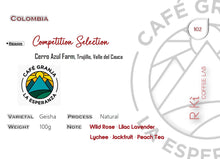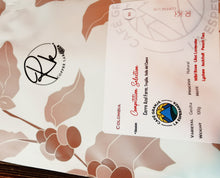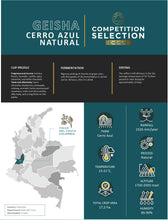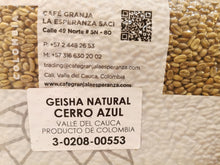FERMENTATION
Rigorous picking of cherries at grape color,
with Brix grades of 18, fermentation is carried
out for 36 hours, then it is dried.
DRYING
The coffee is left 48 hours in the silo
(average temperature of 35 °C) then
passed to solar drying for
approximately 15 days.

 CERRO AZUL
CERRO AZUL
Department: Valle del Cauca
Municipality: Trujillo
Number of lots: 7
Total crop area: 17,4 ha.
Number of trees: 33.879
Minimum altitude: 1.700 masl.
Maximum altitude: 2.000 masl.
Minimum temperature: 15°C
Maximum temperature: 21°C
Rainfall: 1.526 mm/year
Humidity: 85 – 90%

 LAS MARGARITAS
LAS MARGARITAS
Country: Colombia
Department: Valle del Cauca
Municipality: Caicedonia
Number of lots: 13
Total crop area: 33,8 ha.
Number of trees: 94.367
Minimum altitude: 1.570 masl.
Maximum altitude: 1.850 masl.
Minimum temperature: 17°C
Maximum temperature: 22°C
Rainfall: 1.340 mm/year
Humidity: 73%

 LA ESPERANZA
LA ESPERANZA
Country: Colombia
Department: Valle del Cauca
Municipality: Trujillo
Number of lots: 11
Total crop area: 34.3 ha.
Number of trees: 96.600
Minimum altitude: 1.430 masl.
Maximum altitude: 1.760 masl.
Minimum temperature: 20°C
Maximum temperature: 23°C
Rainfall: 1.526 mm/year
Humidity: 80 – 85%

 POTOSÍ
POTOSÍ
Country: Colombia
Department: Valle del Cauca
Municipality: Caicedonia
Number of lots: 10
Total crop area: 52 ha.
Number of trees: 188.725
Minimum altitude: 1.400 masl.
Maximum altitude: 1.860 masl.
Minimum temperature: 17°C
Maximum temperature: 22°C
Rainfall: 1.340 mm/year
Humidity: 73%

 HAWAII
HAWAII
Country: Colombia
Department: Cundinamarca
Municipality: Sasaima
Number of lots: 10
Total crop area: 12,5 ha.
Number of trees: 35.098
Minimum altitude: 1.450 masl.
Maximum altitude: 1.530 masl.
Minimum temperature: 20°C
Maximum temperature: 23°C
Rainfall: 1.900 mm/year
Humidity: 71%
Blanca ligia correa (mother) and juan antonio herrera(father) married and had fourteen children. The couple were then later assigned to work and live at the postosi farm. In 1945 Juan Antonio decided to introduce three different varieties to the existing Typica, and that is how he started a crop of Yellow Bourbon, Red Bourbon and Caturra. In 1945, Café Granja La Esperanza was born.
Over the upcoming years, there weren’t major changes in their way of life, besides of raising a big family which was the Colombian tradition in those days. Following this and the lack of labor, the children had to help by doing farm work. After many years of hard work, the farm was very productive regardless of the changes in the country and in the international coffee market. Two of the eleven kids, Rigoberto and Luis, showed special interest in coffee production and processing.

Besides Potosí, another farm in the Trujillo region was acquired to enlarge the organic production, La Esperanza farm. In the year 2007 Don Rigoberto had the chance to lease and manage a coffee farm in the region of Boquete in Panama, called “La Carleida”, and a year later obtained first place in the “Best coffee of Panama”, organized by the Specialty Coffee Association of Panama. At this point he decided to bring some of the Geisha seeds to Colombia, starting a new era in the history of Granja La Esperanza.

Café Granja La Esperanza specializes in the production and commercialization of specialty coffee varietals, facing huge challenges as the adaptation of these varietals to the Colombian soil and climate conditions are quite difficult. Also, having to face against competitors in every specialty coffee market around the world. Our profiles are recognized and highly appreciated, and every day we continue to improve and always seek to make a difference.








